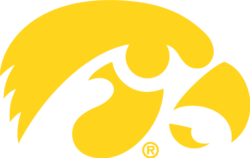24 Hawkeyes to Watch 2019-20 | Hawk Talk Monthly – June | Fight For Iowa | Hawkeye Fan Shop — A Black & Gold Store – https://hawkeyefanshop.com/?utm_source=HawkeyeSports&utm_medium=HawkeyeSports&utm_campaign=HawkeyeSports
By DARREN MILLER
hawkeyesports.com
IOWA CITY, Iowa — The athletic training program at the University of Iowa has a long history of success and it is once again surging ahead of the curve relative to its peers.

For decades, the University of Iowa has educated undergraduate and graduate-level students in athletic training with one of the nation’s best programs. A year ago, this educational component of the athletic training program transitioned out of the College of Liberal Arts and Sciences and into the Department of Orthopedic Surgery and Rehabilitation within the UI Carver College of Medicine. Beginning July 2, all athletic trainers caring for University of Iowa student-athletes moved from the University of Iowa Athletics Department and joined the University of Iowa Department of Orthopedic Surgery and Rehabilitation within the UI Carver College of Medicine, supervised by Dr. Brian Wolf, director of sports medicine.
A major benefit will be having direct reporting of all sports medicine personnel through a medical chain; it also consolidates the different components of athletic training which had been spread all over the University of Iowa.
Iowa is the first school in the Big Ten Conference to undergo this structural shift and it is believed to be the second Power 5 institution to do so.
“Everyone is excited about these changes and for us to be on the forefront of modern, high-level sports medicine at a Power 5 school,” Wolf said. “The thought is to keep medical care separate and distinct from the performance, coaching, and big business of college athletics.”
Wolf said guidelines put out by the Commission on Accreditation of Athletic Training Education encouraged all education programs to be affiliated with a medical department. That led Iowa to move its athletic training curriculum into the College of Medicine, where Dr. Megan Lundstrom is the program director.
When that was complete, the next phase was moving athletic trainers at the University of Iowa into a medical setting as well.
“There is language by NCAA sports science that every attempt be made to try to have the sports medicine team be an independent entity,” Wolf said. “We redesigned our structure to all trainers being employees of the orthopedic department.”
This change aligns the best practices of athletic training related to treatment of student-athlete injuries and health conditions, and minimizes the potential conflict of interest between coaches and sports medicine staff. This alignment provides the most transparent reporting line to assure sports medicine and sports performance practitioners are aligned to an athlete-centered model of health care.
“In any profession, you want to lead the way and elevate that profession,” said Kammy Powell, head athletic trainer for football. “We are health care professionals and we are seen as health care professionals with a medical background.”
Terry Noonan, assistant athletics director for sports medicine and sports performance, remains an athletics department employee. While athletic trainers are employees of the University of Iowa Hospitals and Clinics, nothing has changed related to their daily job functions or support for Iowa’s student-athletes. The Iowa Athletics Department works closely with the Department of Orthopedics to help support costs related to athletic medical care, including athletic trainer salaries.
“Most of my position is administrative with policies and procedures, budgeting, insurance and making sure all the events are covered,” Noonan said. “We wanted someone to stay within the department to make sure all that was controlled.”
The football strength and conditioning coaches remain athletics department employees, reporting to Dr. Andy Peterson; the remaining strength and conditioning coaches, serving under the umbrella of the new sports performance model, report to Noonan.
“Iowa athletics is thrilled to be a leader in the health care provided for our student-athletes,” said Gary Barta, University of Iowa Henry B. and Patricia B. Tippie Director of Athletics Chair. “Our partnership with the University of Iowa Hospitals and Clinics continues to ensure our athletes receive the most up-to-date medical care available. Distinguishing between the medical and athletic performance needs of our student-athletes is important to our success. We place great value on our relationship with Dr. Wolf and the University of Iowa health care team.”


%20--%3e%3csvg%20xmlns:inkpad='http://taptrix.com/inkpad/svg_extensions'%20height='231pt'%20xmlns:xlink='http://www.w3.org/1999/xlink'%20xmlns='http://www.w3.org/2000/svg'%20width='796pt'%20version='1.1'%20viewBox='0,0,796,231'%3e%3cdefs/%3e%3cg%20id='Untitled'%20inkpad:layerName='Untitled'%3e%3cpath%20d='M102.252+48.3067L83.5399+48.3067L83.5399+182.202L102.252+182.202L102.252+230.822L-0.0490809+230.822L-0.0490809+182.202L18.6626+182.202L18.6626+48.3067L-0.0490809+48.3067L-0.0490809+0.300613L102.252+0.300613L102.252+48.3067ZM239.828+230.822L165.748+230.822C138.908+230.822+121.27+213.184+121.27+184.35L121.27+46.773C121.27+18.092+139.215+0.300602+165.748+0.300602L239.828+0.300602C266.669+0.300602+284.307+18.2454+284.307+46.773L284.307+184.35C284.307+213.031+266.362+230.822+239.828+230.822ZM218.816+182.356L218.816+48.4601L186.607+48.4601L186.607+182.356L218.816+182.356ZM313.448+48.3067L297.037+48.3067L297.037+0.300613L394.123+0.300613L394.123+48.6135L375.718+48.6135L392.282+159.503L426.945+0.300613L476.025+0.300613L512.834+159.503L526.178+48.6135L509.307+48.6135L509.307+0.300613L605.166+0.300613L605.166+48.6135L589.368+48.6135L560.534+231.129L482.313+231.129L451.945+95.0859L420.963+230.822L345.81+230.822L313.448+48.3067ZM588.141+182.356L605.779+182.356L640.902+0.300613L745.656+0.300613L780.166+182.356L796.577+182.356L796.577+230.975L718.356+230.975L710.994+174.687L672.19+174.687L665.288+230.975L588.601+230.975L588.141+182.356L588.141+182.356ZM706.853+132.509L691.975+39.4111L676.638+132.509L706.853+132.509Z'%20opacity='1'%20fill='%23ffcd00'/%3e%3c/g%3e%3c/svg%3e)